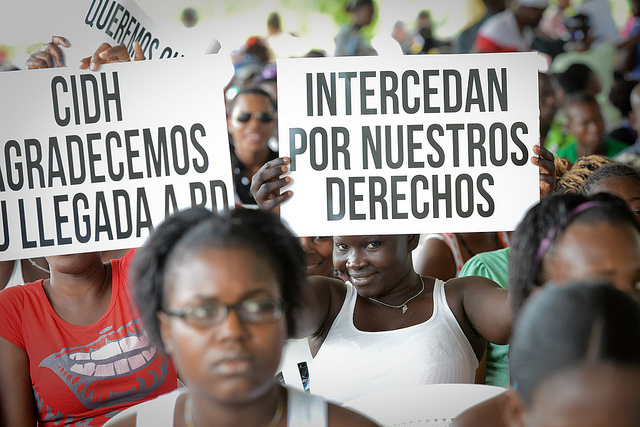






Washington D.C., July 29th, 2015— The Center for Justice and International Law (CEJIL) calls on the Dominican Republic to comply with its obligations as a member of the international community and member state of many international human rights instruments, and guarantee the right to nationality of all Dominicans of Haitian descent without discrimination, as well as the rights of migrants and their families who live in vulnerable situations due to their inability to obtain documentation or legal status.
Both the Inter-American Court of Human Rights and the Inter-American Commission on Human Rights (I-A Court and IACHR, respectively) have repeatedly ruled on these obligations, as have various bodies of the United Nations (UN). In the struggle for the eradication and prevention of statelessness the breach dates back to the decision issued by the Inter-American Court on the case of Yean and Bosico which was litigated by CEJIL in 2005.
The current situation in the Dominican Republic is the result of the implementation of two interrelated legal frameworks regarding nationality and immigration regulation.
The first response involved the adoption of Law 169-14, which tried to provide a solution to the retroactive denationalization of thousands of people born in the country of foreign descent, the majority Haitian, caused by Constitutional Court ruling 168-13. Law 169-14 allowed for some of those affected to request documentation through a process that ended this past February.
On June 26th, 2015, the Central Electoral Board published a list which identified 55,000 people who previously had Dominican documents and which the government agreed to recognize as nationals. The State must ensure quick and effective delivery of this documentation, without administrative barriers or discrimination in order for these people to enjoy the numerous rights linked to nationality. According to the information available to date, only 376 documents from the list have been printed. The total number of people who were excluded from this process, even those who held Dominican papers, is uncertain. Additionally, those who are not included on the list but belong in the same category should also have their nationality guaranteed.
Unlike the aforementioned group, individuals who were born in the country but never had Dominican documents were obligated to declare themselves as foreigners in order navigate through a naturalization process. However, actions which involve forcing a national to naturalize were condemned by the Inter-American Court in 2014. Due to a limited inscription time-frame and added complexities involving the necessary requisites, only 8,775 Dominicans were able to sign up. However, according to numbers published by diverse international bodies, the number of people in this category could be between 45,000 to 150, 000 people.
The second response was the National Foreigner Regularization Plan (PNRE) intended for people with irregular migratory status. This plan, which closed on June 17th, set ambiguous registration requirements that did not take into consideration specific economics and bureaucratic barriers that affected the target population, including the prohibitive costs associated with extensive notarization of documents and certifications. As a result, more than 288,000 people registered. According to the information published by the Ministry of Interior and the Police, only 7,956 documents have been given to date, or only 2.7% of the applicants. In addition, since the end of PNRE, thousands of people have opted to leave the country. It is crucial that the authorities ensure that the naturalization process is implemented without discrimination or delays because of the consequences this situation has on the enjoyment of fundamental rights.
In the past months, more than 36,000 people have decided to leave the country for Haiti. The tone of the debate emanating from public figures and senior government officials in the Dominican Republic, the precarious conditions for the reception of such a large number of people, and the lack of processes in order to guarantee the rights of these people raises questions about the voluntary nature of these repatriations and the effects it has on those who do have the right to reside in the Dominican Republic.
On a closer analysis, one of the principle obstacles in understanding the dimensions of this problem is the absence of concrete numbers of Dominicans and foreigners that are vulnerable due to a lack of documentation. Additionally, one of the failings in the implementation of the two frameworks has been the lack of an adequate availability of information and education so that recipients can have effective access to their rights. According to reports, numerous people were left behind due to a lack of knowledge, short timelines, or to procedural complexities. Moreover, we identify the submission of a national to a process of naturalization, however brief it is, as a fundamental problem.
We call on the Dominican authorities to guarantee the right to the nationality of Dominicans and Dominicans arbitrarily deprived of their nationality; to respect human rights when carrying out their immigration policy; and to publish updated and accurate information on those people affected by both plans. We also urge the Haitian government to submit the documents to those who require proof of their ancestry with the country in order to regularize their situation. We urge the Dominican government to abide by the judgments of the Inter-American Court through a full recognition of the institutional, cultural, and economic challenges that hinder access to identity documents to all persons who were born in the country.
Link to background information.
¡Ayúdanos a continuar este trabajo crítico y urgente con una donación!
DONA AHORA